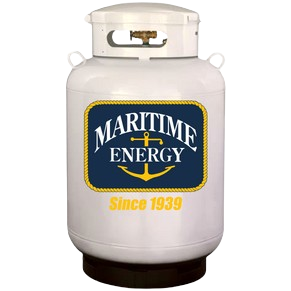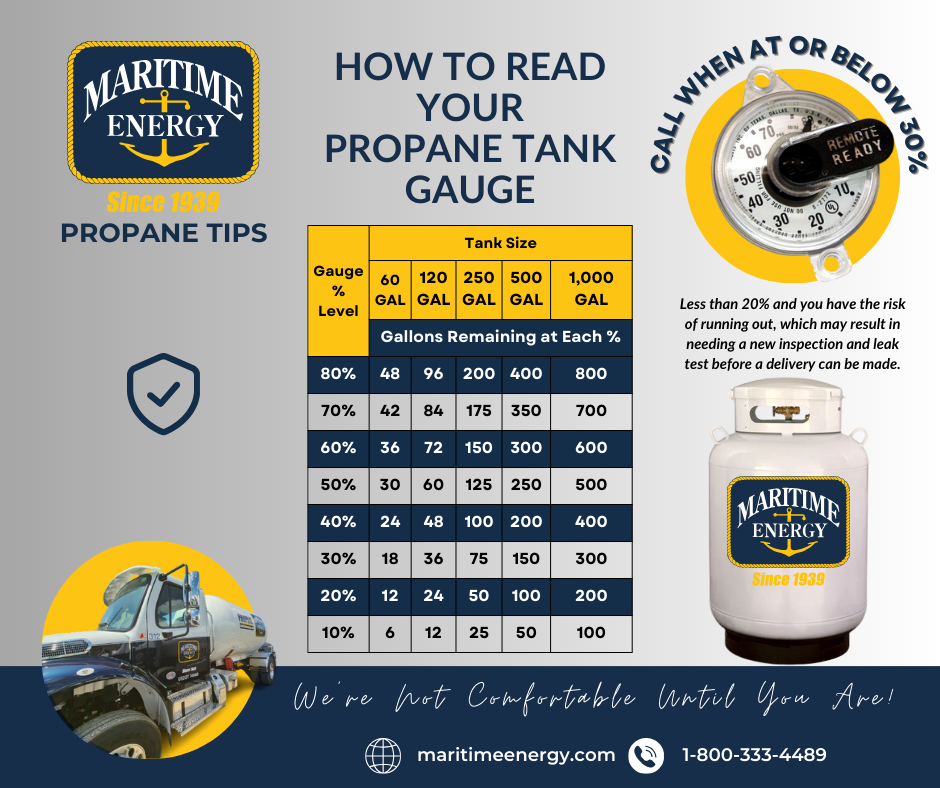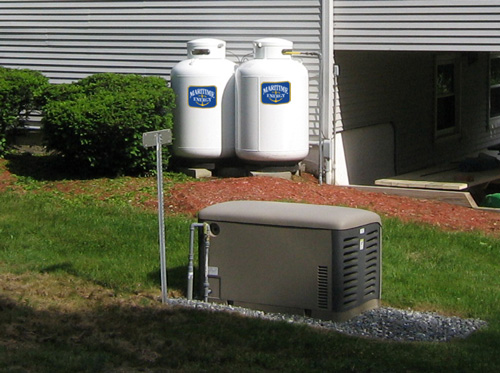Propane Gas – A Safe and Clean Energy Source
Maritime Energy’s #1 Priority Is Always Safety
Our goal is to educate our employees, customers, and communities on the facts about Propane Gas (LP). Explore the information below to learn more and to get the facts on this clean, renewable, and SAFE energy alternative.

Propane gas remains a popular choice for heating homes and powering appliances. Propane is not only versatile and efficient, but also boasts a strong safety record and a lower environmental impact compared to many other fuels. Propane is a great fuel source for standby generators, forklifts, and a variety of other commercial and residential needs.
What To Do If You Smell Propane Gas
- NO FLAMES OR SPARKS. Immediately put out all smoking materials and other open flames. Do not operate lights, appliances, telephones, or cell phones. Flames or sparks from these sources can trigger an explosion or a fire
- LEAVE THE AREA IMMEDIATELY. Get everyone out of the building or area where you suspect gas is leaking
- SHUT OFF THE GAS. Turn off the main gas supply valve on your propane tank if it is safe to do so. To close the valve, turn it to the right (clockwise)
- REPORT THE LEAK. From a neighbor’s home or other nearby location away from the gas leak, call Maritime Energy (or your current propane supplier) as soon as you are in a safe location to do so. If you believe there to be an emergency call 911 or your local fire department
- DO NOT RETURN TO THE BUILDING OR AREA until your propane supplier, emergency responder, or qualified service technician determines that it is safe to do so
- GET YOUR SYSTEM CHECKED. Before you attempt to use any of your propane appliances, your propane supplier or a qualified service technician must check your entire system to ensure that it is leak-free
How to Read Your Propane Tank Gauge
If you’re using propane to provide heat, hot water, appliances, and more, then you may consume your gallons much faster

Info & Safety Videos
Scroll through the selection below to watch!
Instructional Videos from our friends at Propane.com
Safety
-
-
- Leak Detection: Propane has a strong, distinctive smell (like rotten eggs or skunk spray) added to it to help users detect leaks.
- Combustion: Propane only ignites when mixed with air in a specific ratio and exposed to an ignition source above 920°F, making it safer than many other fuels.
- No Residue: Propane gas does not spill, pool, or leave a residue, making it harmless to soil or groundwater if a tank leaks.
- Professional Maintenance: It’s recommended to have a qualified service technician perform all maintenance and repairs to ensure safety.
-
Cleanliness
-
-
- Clean Burning: Propane is one of the lightest hydrocarbons in existence, making it one of the cleanest burning of all fossil fuels.
- Low Emissions: Propane combustion produces fewer emissions than coal or unleaded gasoline, and other fuels.
- Efficiency: Propane appliances, such as furnaces and tankless water heaters, can be highly efficient, with some models achieving up to 98% efficiency.
- Environmental Impact: Propane is listed as a clean alternative fuel in the 1990 amendments to the Clean Air Act and the National Energy Policy Act of 1992. Neither the process by which propane is produced nor the combustion of propane gas produces significant contaminants. Propane gas, with its strong safety features and low environmental impact, is a responsible choice for energy-conscious consumers. Always remember to follow safety guidelines when using propane to ensure a safe and efficient experience.
-
Please check your tank gauge often during the heating season to avoid running out!
And remember, never operate a generator indoors!

